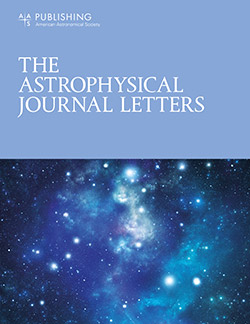Electron–Ion Heating Partition in Imbalanced Solar-wind Turbulence
IF 8.8
1区 物理与天体物理
Q1 ASTRONOMY & ASTROPHYSICS
引用次数: 0
Abstract
Abstract A likely candidate mechanism to heat the solar corona and solar wind is low-frequency “Alfvénic” turbulence sourced by magnetic fluctuations near the solar surface. Depending on its properties, such turbulence can heat different species via different mechanisms, and the comparison of theoretical predictions to observed temperatures, wind speeds, anisotropies, and their variation with heliocentric radius provides a sensitive test of this physics. Here we explore the importance of normalized cross helicity, or imbalance, for controlling solar-wind heating, since it is a key parameter of magnetized turbulence and varies systematically with wind speed and radius. Based on a hybrid-kinetic simulation in which the forcing’s imbalance decreases with time—a crude model for a plasma parcel entrained in the outflowing wind—we demonstrate how significant changes to the turbulence and heating result from the “helicity barrier” effect. Its dissolution at low imbalance causes its characteristic features—strong perpendicular ion heating with a steep “transition-range” drop in electromagnetic fluctuation spectra—to disappear, driving a larger fraction of the energy into electrons and parallel ion heat, and halting the emission of ion-scale waves. These predictions seem to agree with a diverse array of solar-wind observations, offering to explain a variety of complex correlations and features within a single theoretical framework.不平衡太阳风湍流中的电子-离子加热分区
一种可能的加热日冕和太阳风的机制是由太阳表面磁场波动引起的低频“alfvsamicic”湍流。根据它的性质,这种湍流可以通过不同的机制加热不同的物种,将理论预测与观测到的温度、风速、各向异性及其随日心半径的变化进行比较,为这种物理学提供了一个敏感的测试。在这里,我们探讨了标准化交叉螺旋度或不平衡度对控制太阳风加热的重要性,因为它是磁化湍流的关键参数,并随风速和半径系统地变化。在混合动力学模拟的基础上,强迫的不平衡随着时间的推移而减少——这是一个在外流风中携带等离子体包裹的粗略模型——我们证明了“螺旋障壁”效应是如何导致湍流和加热的显著变化的。它在低不平衡状态下的溶解使它的特征——强烈的垂直离子加热和电磁波动谱的急剧“过渡范围”下降——消失,将更大一部分能量驱动成电子和平行离子热,并停止离子尺度波的发射。这些预测似乎与各种各样的太阳风观测相一致,在一个单一的理论框架内解释了各种复杂的相关性和特征。
本文章由计算机程序翻译,如有差异,请以英文原文为准。
求助全文
约1分钟内获得全文
求助全文
来源期刊

Astrophysical Journal Letters
ASTRONOMY & ASTROPHYSICS-
CiteScore
14.10
自引率
6.30%
发文量
513
审稿时长
2-3 weeks
期刊介绍:
The Astrophysical Journal Letters (ApJL) is widely regarded as the foremost journal for swiftly disseminating groundbreaking astronomical research. It focuses on concise reports that highlight pivotal advancements in the field of astrophysics. By prioritizing timeliness and the generation of immediate interest among researchers, ApJL showcases articles featuring novel discoveries and critical findings that have a profound effect on the scientific community. Moreover, ApJL ensures that published articles are comprehensive in their scope, presenting context that can be readily comprehensible to scientists who may not possess expertise in the specific disciplines covered.
 求助内容:
求助内容: 应助结果提醒方式:
应助结果提醒方式:


